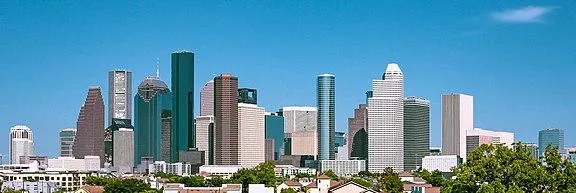Blog > Article Library
Twain Services Articles

History of Houston TX
History of Houston TX
Houston, the fourth-largest city in the United States, stands as a testament to the resilience, innovation, and diversity that characterize the American spirit. From its humble beginnings as a small trading post to its current status as a global hub for energy, space exploration, and cultural diversity, the history of Houston is as rich and varied as the people who call it home.
Early Settlement and Foundation:
Houston's history traces back to August 1836, when brothers Augustus Chapman Allen and John Kirby Allen purchased land near the banks of Buffalo Bayou in the newly formed Republic of Texas. They envisioned a thriving city and named it after Sam Houston, the hero of the Texas Revolution and the first president of the Republic of Texas. The Allen brothers laid out the city's streets and established Houston as the new republic's capital in 1837.
Growth and Development:
Houston's strategic location along the Gulf Coast and its proximity to fertile land and waterways fueled its growth as a commercial and transportation hub. The arrival of the railroad in the 1850s further facilitated trade and commerce, transforming Houston into a bustling center for cotton, lumber, and shipping industries. By the late 19th century, Houston had emerged as one of the leading cities in Texas, attracting settlers from across the country and abroad.
Oil Boom and Industrial Expansion:
The discovery of oil at Spindletop near Beaumont in 1901 marked the beginning of the Texas oil boom, which would significantly impact Houston's economy and identity. As the demand for oil soared, Houston became a major center for the oil and gas industry, with numerous refineries, petrochemical plants, and energy companies establishing operations in the city. The Port of Houston, opened in 1914, further solidified Houston's position as a key player in the global energy market.
World War II and Post-War Growth:
During World War II, Houston's economy received a significant boost from military contracts and the influx of defense-related industries. The city's population swelled as thousands of people migrated to Houston in search of employment opportunities. After the war, Houston experienced rapid population growth and urban expansion, fueled by the availability of affordable housing, a thriving economy, and the construction of major infrastructure projects such as the Houston Ship Channel and the Interstate Highway System.
Space Exploration and Technological Innovation:
In the 1960s, Houston gained international recognition as the home of NASA's Manned Spacecraft Center, later renamed the Lyndon B. Johnson Space Center. The Space Race between the United States and the Soviet Union brought unprecedented attention to Houston as astronauts trained for historic missions to the moon. Houston's connection to space exploration fostered a culture of innovation and technological advancement, leading to the growth of industries such as aerospace, biotechnology, and healthcare.
Cultural Diversity and Civil Rights:
Throughout its history, Houston has been shaped by waves of immigration and cultural diversity. The city's vibrant multicultural population includes people of diverse ethnicities, religions, and backgrounds, contributing to its rich tapestry of languages, cuisines, and traditions. Houston played a significant role in the civil rights movement, with activists like Dr. Martin Luther King Jr. and Congresswoman Barbara Jordan advocating for equality and social justice.
Resilience in the Face of Challenges:
Houston has weathered its share of challenges, including natural disasters such as hurricanes, economic downturns, and social upheavals. In recent years, the city has faced catastrophic flooding events, most notably during Hurricane Harvey in 2017. However, Houstonians have demonstrated remarkable resilience and community spirit in the aftermath of such events, coming together to rebuild and support one another.
Looking to the Future:
As Houston continues to evolve and grow, the city faces new opportunities and challenges in the 21st century. With its diverse economy, world-class institutions, and entrepreneurial spirit, Houston is poised to remain a global leader in energy, innovation, and culture. As the city embraces its past while looking to the future, one thing remains certain: the spirit of Houston will continue to shine bright, inspiring generations to come.
In conclusion, the history of Houston, Texas, is a captivating tale of ambition, perseverance, and diversity. From its humble beginnings as a frontier outpost to its current status as a dynamic metropolis, Houston's journey reflects the ever-changing landscape of American history and the enduring spirit of its people. As Houstonians forge ahead into the future, they carry with them the lessons of the past and the promise of a brighter tomorrow.

Image Reference: https://en.wikipedia.org/wiki/Houston
Questions & Answers about Houston TX
Q: Who were the founders of Houston, Texas, and when was the city established?
A: Houston, Texas, was founded by brothers Augustus Chapman Allen and John Kirby Allen in August 1836. They purchased land near the banks of Buffalo Bayou and named the city after Sam Houston, the hero of the Texas Revolution.
Q: What major industry transformed Houston's economy in the early 20th century?
A: The discovery of oil at Spindletop near Beaumont in 1901 marked the beginning of the Texas oil boom, which significantly impacted Houston's economy. The city emerged as a major center for the oil and gas industry, attracting numerous refineries, petrochemical plants, and energy companies.
Q: What role did Houston play in the Space Race during the 1960s?
A: Houston gained international recognition as the home of NASA's Manned Spacecraft Center, later renamed the Lyndon B. Johnson Space Center. Astronauts trained in Houston for historic missions to the moon, and the city became synonymous with space exploration and technological innovation.
Q: How has Houston's population and urban development changed since World War II?
A: After World War II, Houston experienced rapid population growth and urban expansion fueled by the availability of affordable housing, a thriving economy, and major infrastructure projects such as the Houston Ship Channel and the Interstate Highway System.
Q: What challenges has Houston faced in recent years, and how has the city responded?
A: Houston has faced challenges such as hurricanes, economic downturns, and social upheavals. In the aftermath of catastrophic events like Hurricane Harvey in 2017, Houstonians have demonstrated resilience and community spirit, coming together to rebuild and support one another.
Older Articles


Contact Us
Service Hours
Social Media
Blog > Article Library


History of Houston TX
History of Houston TX
Houston, the fourth-largest city in the United States, stands as a testament to the resilience, innovation, and diversity that characterize the American spirit. From its humble beginnings as a small trading post to its current status as a global hub for energy, space exploration, and cultural diversity, the history of Houston is as rich and varied as the people who call it home.
Early Settlement and Foundation:
Houston's history traces back to August 1836, when brothers Augustus Chapman Allen and John Kirby Allen purchased land near the banks of Buffalo Bayou in the newly formed Republic of Texas. They envisioned a thriving city and named it after Sam Houston, the hero of the Texas Revolution and the first president of the Republic of Texas. The Allen brothers laid out the city's streets and established Houston as the new republic's capital in 1837.
Growth and Development:
Houston's strategic location along the Gulf Coast and its proximity to fertile land and waterways fueled its growth as a commercial and transportation hub. The arrival of the railroad in the 1850s further facilitated trade and commerce, transforming Houston into a bustling center for cotton, lumber, and shipping industries. By the late 19th century, Houston had emerged as one of the leading cities in Texas, attracting settlers from across the country and abroad.
Oil Boom and Industrial Expansion:
The discovery of oil at Spindletop near Beaumont in 1901 marked the beginning of the Texas oil boom, which would significantly impact Houston's economy and identity. As the demand for oil soared, Houston became a major center for the oil and gas industry, with numerous refineries, petrochemical plants, and energy companies establishing operations in the city. The Port of Houston, opened in 1914, further solidified Houston's position as a key player in the global energy market.
World War II and Post-War Growth:
During World War II, Houston's economy received a significant boost from military contracts and the influx of defense-related industries. The city's population swelled as thousands of people migrated to Houston in search of employment opportunities. After the war, Houston experienced rapid population growth and urban expansion, fueled by the availability of affordable housing, a thriving economy, and the construction of major infrastructure projects such as the Houston Ship Channel and the Interstate Highway System.
Space Exploration and Technological Innovation:
In the 1960s, Houston gained international recognition as the home of NASA's Manned Spacecraft Center, later renamed the Lyndon B. Johnson Space Center. The Space Race between the United States and the Soviet Union brought unprecedented attention to Houston as astronauts trained for historic missions to the moon. Houston's connection to space exploration fostered a culture of innovation and technological advancement, leading to the growth of industries such as aerospace, biotechnology, and healthcare.
Cultural Diversity and Civil Rights:
Throughout its history, Houston has been shaped by waves of immigration and cultural diversity. The city's vibrant multicultural population includes people of diverse ethnicities, religions, and backgrounds, contributing to its rich tapestry of languages, cuisines, and traditions. Houston played a significant role in the civil rights movement, with activists like Dr. Martin Luther King Jr. and Congresswoman Barbara Jordan advocating for equality and social justice.
Resilience in the Face of Challenges:
Houston has weathered its share of challenges, including natural disasters such as hurricanes, economic downturns, and social upheavals. In recent years, the city has faced catastrophic flooding events, most notably during Hurricane Harvey in 2017. However, Houstonians have demonstrated remarkable resilience and community spirit in the aftermath of such events, coming together to rebuild and support one another.
Looking to the Future:
As Houston continues to evolve and grow, the city faces new opportunities and challenges in the 21st century. With its diverse economy, world-class institutions, and entrepreneurial spirit, Houston is poised to remain a global leader in energy, innovation, and culture. As the city embraces its past while looking to the future, one thing remains certain: the spirit of Houston will continue to shine bright, inspiring generations to come.
In conclusion, the history of Houston, Texas, is a captivating tale of ambition, perseverance, and diversity. From its humble beginnings as a frontier outpost to its current status as a dynamic metropolis, Houston's journey reflects the ever-changing landscape of American history and the enduring spirit of its people. As Houstonians forge ahead into the future, they carry with them the lessons of the past and the promise of a brighter tomorrow.

Image Reference: https://en.wikipedia.org/wiki/Houston
Questions & Answers about Houston TX
Q: Who were the founders of Houston, Texas, and when was the city established?
A: Houston, Texas, was founded by brothers Augustus Chapman Allen and John Kirby Allen in August 1836. They purchased land near the banks of Buffalo Bayou and named the city after Sam Houston, the hero of the Texas Revolution.
Q: What major industry transformed Houston's economy in the early 20th century?
A: The discovery of oil at Spindletop near Beaumont in 1901 marked the beginning of the Texas oil boom, which significantly impacted Houston's economy. The city emerged as a major center for the oil and gas industry, attracting numerous refineries, petrochemical plants, and energy companies.
Q: What role did Houston play in the Space Race during the 1960s?
A: Houston gained international recognition as the home of NASA's Manned Spacecraft Center, later renamed the Lyndon B. Johnson Space Center. Astronauts trained in Houston for historic missions to the moon, and the city became synonymous with space exploration and technological innovation.
Q: How has Houston's population and urban development changed since World War II?
A: After World War II, Houston experienced rapid population growth and urban expansion fueled by the availability of affordable housing, a thriving economy, and major infrastructure projects such as the Houston Ship Channel and the Interstate Highway System.
Q: What challenges has Houston faced in recent years, and how has the city responded?
A: Houston has faced challenges such as hurricanes, economic downturns, and social upheavals. In the aftermath of catastrophic events like Hurricane Harvey in 2017, Houstonians have demonstrated resilience and community spirit, coming together to rebuild and support one another.
Older Articles


Contact Us
(346) 209-4009
Humble, Texas, 77346
Service Hours
Mon-Sat: 8am-6pm
Sun: Off
Social Media





